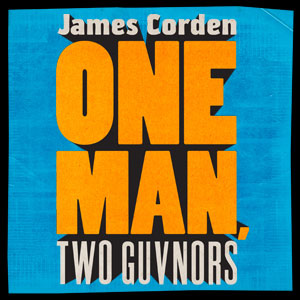ONE HIT, TWO GUVNORS
Once upon a time, you could attend theatre by Americans and watch actors who had worked together for decades. Long rehearsal periods to explore classical texts were commonplace until Reagan cut the NEA. Acting companies were devastated. Today American audiences rarely get to see finely honed ensembles perform collaboratively developed classical theatre. It is cause for celebration when a production like One Man, Two Guvnors finds its way to our shores.
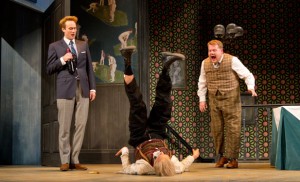 The National Theatre of Great Britain’s production of One Man, Two Guvnors is playwright Richard Bean’s update of Carlo Goldoni’s 18th Century comedy, The Servant of Two Masters. The Goldoni play is classic Commedia dell’Arte, employing low comedy and traditional comic archetypes, including stupid masters, cunning servants, star-crossed lovers, sexy maids, feisty daughters, and miserly fathers. Commedia dell’Arte is also known for its lazzi, comic set-pieces. Bean wisely updates Goldoni’s Venice of the 1790s to the British seaside town of Brighton in the 1960s. While Bean follows Goldoni’s plot, he cleverly breaks free when adapting his own comic dialogue and puts it in a colloquial vernacular. Bean has a confident comic touch. Respectful of his source material, he never misses an opportunity to position a joke, heighten a character’s shortcoming, or play off the audience’s knowledge of life beyond the 1960s. One Man, Two Guvnors is smart, it’s charming, and most importantly, it’s very funny!
The National Theatre of Great Britain’s production of One Man, Two Guvnors is playwright Richard Bean’s update of Carlo Goldoni’s 18th Century comedy, The Servant of Two Masters. The Goldoni play is classic Commedia dell’Arte, employing low comedy and traditional comic archetypes, including stupid masters, cunning servants, star-crossed lovers, sexy maids, feisty daughters, and miserly fathers. Commedia dell’Arte is also known for its lazzi, comic set-pieces. Bean wisely updates Goldoni’s Venice of the 1790s to the British seaside town of Brighton in the 1960s. While Bean follows Goldoni’s plot, he cleverly breaks free when adapting his own comic dialogue and puts it in a colloquial vernacular. Bean has a confident comic touch. Respectful of his source material, he never misses an opportunity to position a joke, heighten a character’s shortcoming, or play off the audience’s knowledge of life beyond the 1960s. One Man, Two Guvnors is smart, it’s charming, and most importantly, it’s very funny!
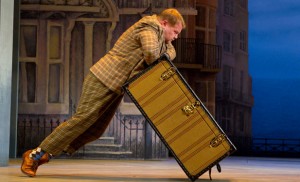 The main reason to see One Man, Two Guvnors is to bask in the glory that is James Corden’s performance as Francis Henshall, an update of Goldoni’s Harlequin. His solid performance as Timms in The History Boys a few seasons back did not prepare us for the delightful star turn he would deliver in One Man, Two Guvnors. Corden’s Henshall is a man-boy without a complete skill set. He lives by instincts and instincts alone. Whether it’s manipulating to get food, money, or sex to satisfy the urge of the moment, it is an absolute pleasure to watch the utterly appealing Corden work the room. That room includes the entire Music Box theatre auditorium. No one breaks a Fourth Wall for direct address like Corden. His interactions with audience members are played seamlessly, subtly remaining a variation of the amiable character he plays in the scene. It’s almost impossible to know where Bean’s text ends and Corden’s improvisation begins, if he’s improvising at all. Whatever the case, it always feels like Corden is making it up as he goes along. James Corden’s genius lies in his ability to act effortlessly and believably in real time.
The main reason to see One Man, Two Guvnors is to bask in the glory that is James Corden’s performance as Francis Henshall, an update of Goldoni’s Harlequin. His solid performance as Timms in The History Boys a few seasons back did not prepare us for the delightful star turn he would deliver in One Man, Two Guvnors. Corden’s Henshall is a man-boy without a complete skill set. He lives by instincts and instincts alone. Whether it’s manipulating to get food, money, or sex to satisfy the urge of the moment, it is an absolute pleasure to watch the utterly appealing Corden work the room. That room includes the entire Music Box theatre auditorium. No one breaks a Fourth Wall for direct address like Corden. His interactions with audience members are played seamlessly, subtly remaining a variation of the amiable character he plays in the scene. It’s almost impossible to know where Bean’s text ends and Corden’s improvisation begins, if he’s improvising at all. Whatever the case, it always feels like Corden is making it up as he goes along. James Corden’s genius lies in his ability to act effortlessly and believably in real time.
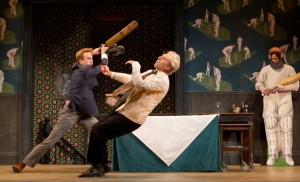 Corden is onstage with an ensemble of peers also working at the peak of their craft. Dashing, wealthy, and perverse Stanley Stubbers is brilliantly played by Oliver Chris. He has a rare knack for embracing his character as archetype, yet never letting us know what he’ll come up with next. Jemina Rooper plays Rachel Crabbe, a “pants” role as she impersonates her dead gay brother, all the while set on sailing off into the sunset with rich, handsome Stanley. Diminutive Rooper plays both twins with equal gusto, fierce and threatening as the gay brother, tender and committed as her straight self. Suzie Toase plays sexy, curvy secretary and Henshall’s love interest Dolly as the smartest person in the room, except when it comes to matters of love. Claire Lams gives us a dim ingénue in Pauline Clench, a pretty little picnic shy of a few sandwiches. No matter, she is destined to pair up with Alan Dangle, narcissistic actor wannabe, played to perfection by Daniel Rigby, all black turtle necks and Hamlet-y angst, a perfect fit of cluelessness for Lams’ ditsy Pauline. Rounding out the top-notch performances, Tom Edden plays Alfie, the new but very old waiter, a performance of such spot on comic precision that I couldn’t wait for him to come back onstage to serve up the next course of comic business. It’s a testament to Edden’s acting expertise to learn later that he is more than a generation younger than the geriatric Alfie he plays.
Corden is onstage with an ensemble of peers also working at the peak of their craft. Dashing, wealthy, and perverse Stanley Stubbers is brilliantly played by Oliver Chris. He has a rare knack for embracing his character as archetype, yet never letting us know what he’ll come up with next. Jemina Rooper plays Rachel Crabbe, a “pants” role as she impersonates her dead gay brother, all the while set on sailing off into the sunset with rich, handsome Stanley. Diminutive Rooper plays both twins with equal gusto, fierce and threatening as the gay brother, tender and committed as her straight self. Suzie Toase plays sexy, curvy secretary and Henshall’s love interest Dolly as the smartest person in the room, except when it comes to matters of love. Claire Lams gives us a dim ingénue in Pauline Clench, a pretty little picnic shy of a few sandwiches. No matter, she is destined to pair up with Alan Dangle, narcissistic actor wannabe, played to perfection by Daniel Rigby, all black turtle necks and Hamlet-y angst, a perfect fit of cluelessness for Lams’ ditsy Pauline. Rounding out the top-notch performances, Tom Edden plays Alfie, the new but very old waiter, a performance of such spot on comic precision that I couldn’t wait for him to come back onstage to serve up the next course of comic business. It’s a testament to Edden’s acting expertise to learn later that he is more than a generation younger than the geriatric Alfie he plays.
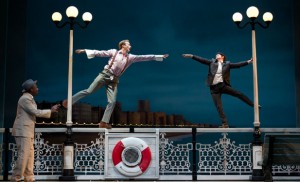 Nicholas Hytner proves once again he’s one of the most exciting theatre directors working in the world today, showing time and again that he can take the old and make it brand new again; the show has a crisp pace and a clear vision. Hytner works beautifully with Physical Comedy Director Cal McCrystal to create a world of constant comedy, where every laugh is grounded in truth; nothing feels like cheap schtick.
Nicholas Hytner proves once again he’s one of the most exciting theatre directors working in the world today, showing time and again that he can take the old and make it brand new again; the show has a crisp pace and a clear vision. Hytner works beautifully with Physical Comedy Director Cal McCrystal to create a world of constant comedy, where every laugh is grounded in truth; nothing feels like cheap schtick.
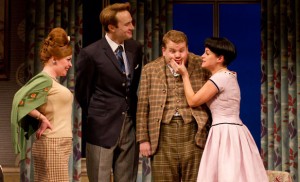 Hytner helms his design team with a consistent eye on fun. Mark Thompson’s designs pop with the color and snap of ’˜60’s cool. Hytner knows that Bean’s world demands some form of music to take it to a higher level. He wisely uses Grant Olding’s songs as the mortar that frames the piece and holds it together. As the audience gathers at the top of the show, we are primed with a set of early boy band rock ’˜n roll songs. The concert continues between set changes, sometimes illuminating a character, sometimes elucidating a theme, always entertaining and delighting. The gestalt of Hytner’s production is a feeling that we’ve attended a unique, hysterically funny party, peopled with fabulously zany folks. It’s a perfect antidote for troubled times.
Hytner helms his design team with a consistent eye on fun. Mark Thompson’s designs pop with the color and snap of ’˜60’s cool. Hytner knows that Bean’s world demands some form of music to take it to a higher level. He wisely uses Grant Olding’s songs as the mortar that frames the piece and holds it together. As the audience gathers at the top of the show, we are primed with a set of early boy band rock ’˜n roll songs. The concert continues between set changes, sometimes illuminating a character, sometimes elucidating a theme, always entertaining and delighting. The gestalt of Hytner’s production is a feeling that we’ve attended a unique, hysterically funny party, peopled with fabulously zany folks. It’s a perfect antidote for troubled times.
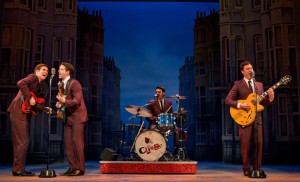 My only caveat is the dialect. In America, multi-cultural theatre usually means color-blind casting or the diversity of ideas. In British theatre, it also includes regional dialects. The old BBC English, aka RP (Received Pronunciation), is now considered a politically incorrect imposition of speech. Hytner’s world is a salad of dialects, including touches of Caribbean and regional British dialects with a nod to the much maligned RP. It may take a minute for the American ear to adjust to One Man, Two Guvnors’ hodgepodge of English accents, but the payoff is a world that takes on even greater universal inclusiveness.
My only caveat is the dialect. In America, multi-cultural theatre usually means color-blind casting or the diversity of ideas. In British theatre, it also includes regional dialects. The old BBC English, aka RP (Received Pronunciation), is now considered a politically incorrect imposition of speech. Hytner’s world is a salad of dialects, including touches of Caribbean and regional British dialects with a nod to the much maligned RP. It may take a minute for the American ear to adjust to One Man, Two Guvnors’ hodgepodge of English accents, but the payoff is a world that takes on even greater universal inclusiveness.
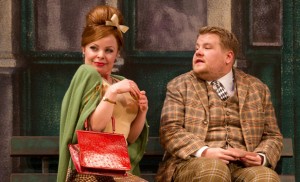 You’d be hard-pressed to find a production as good as One Man, Two Guvnors anywhere in the USA. As Britain continues to cut arts funding, this sort of work might become one of its casualties. One Man, Two Guvnors is one show not to be missed!
You’d be hard-pressed to find a production as good as One Man, Two Guvnors anywhere in the USA. As Britain continues to cut arts funding, this sort of work might become one of its casualties. One Man, Two Guvnors is one show not to be missed!
.
photos by Joan Marcus
One Man, Two Guvnors
The National Theatre of Great Britain’s production at The Music Box in New York City
scheduled to end on September 2, 2012
for tickets, visit http://onemantwoguvnorsbroadway.com/tickets.html
